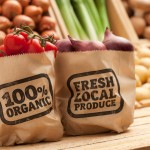A new group will rate Congress with a food policy scorecard, according to the Environmental Working Group. The new group, a 501c(4) nonprofit organization, will consist of food and agriculture policy leaders. This will be the first time an organization has rated politicians on their votes and stance on issues such as food safety, farm subsidies, farm animal welfare, organic and local food, nutrition assistance, fisheries management, and farm and food worker justice. The new group will issue the scorecard in the fall of 2012. It will be based on floor votes during the 112th Congress, as well as amendments proposed to the Agriculture Reform, Food, and Jobs Act, otherwise known as the 2012 Farm Bill. That bill is currently being amended and discussed in the United States Senate. EWG … [Read more...]
Are Organic Food Consumers More Smug?
Everyone has been lectured at one point or another by someone who is convinced of the superiority of their own personal eating plan. In the 1970s, the stereotype of the judgmental health food advocate was pretty established. So is it true? Are organic food consumers more smug? A study that recently appeared in the Journal of Social Psychological & Personality Science, conducted by Dr. Kendall J. Eskine, has revealed that that stereotype may be true. The study is called "Wholesome Foods and Wholesome Morals? Organic Foods Reuce Pro-Social Behavior and Harshen Moral Judgments." Dr. Eskine conducted experiments in which he showed participants organic foods, comfort foods, and control foods. Then the subjects were introduced to a "needy stranger". Participants who were shown … [Read more...]
Organic Foods Not Always Safer
If you want to eat food that hasn't been sprayed with pesticides or herbicides, buy organic. In fact, certified organic foods are regulated by the USDA and grown under strict guidelines. Synthetic fertilizers, irradiation, and genetic engineering are forbidden. Certification is a long-term commitment that may take years to achieve, since one of the qualifications is that the field has to be free from pesticides for three years preceding planting. Cows, chickens, and pigs raised organically are not fed antibiotics as a matter of course and don't eat feed that has been grown with any 'cide. Testing done on foods has prompted the Environmental Working Group to create a list called "The Dirty Dozen" and "Clean 15". The "Dirty Dozen" list includes produce that is generally high in pesticide … [Read more...]






